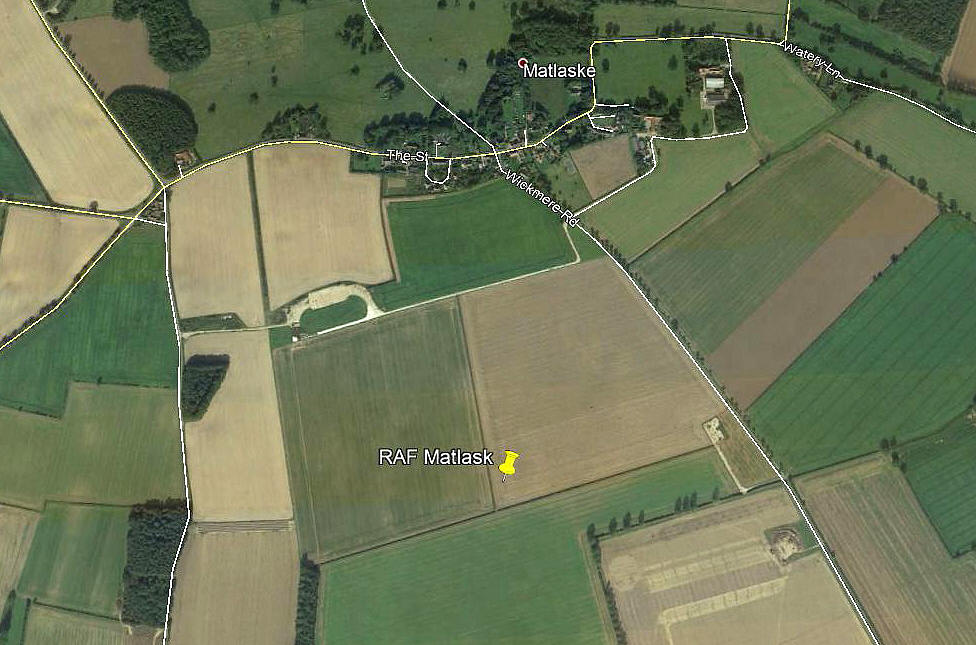Matlask
MATLASK: Military aerodrome
Note: This picture (2017) was obtained from Google Earth ©
If aided by a WW2 map of the airfield, the extent of this airfield is still clearly visible. And, even today (2019) the roughly 'horseshoe' shaped concrete apron leading to, presumably the hangar, stll exists.
Military users: RAF Fighter Command 12 Group
56 Sqdn (Hawker Typhoons)
229, 602 & 611 (West Lancashire) Sqdns (Vickers-Supermarine Spitfires)
453 RAAF (Royal Australian Air Force) Sqdn (Spitfires)
278 [Air Sea Rescue] Sqdn (Avro Ansons, Supermarine Sea Otters, Spitfires & Walrus, Vickers Warwicks and Westland Lysanders)
Location: SE of Plumstead, SSW of Matlaske & NE of Liitle Barningham villages, 5nm SE of Holt
Period of operation: 1940 to 1945
Runways: NW/SE 1463 grass SW/NE 1189 grass
NOTES: For some odd reason, (can anybody explain why?), it appears the 'E' behind Matlarske appears to have been dropped for the airfield. A very odd if not unique occurrence of this happening.
I expect few people today know of this aerodrome but it did have up to 2543 RAF personnel plus 134 WAAFs on station so it was obviously a fairly major Fighter Command aerodrome.
AIR-SEA RESCUE
278 Air Sea Rescue Squadron was one of only four squadrons specifically tasked for ASR duties in 1941 and they typically had detachments elsewhere; in the case of 278 Sqdn in Scotland. It must be borne in mind that until WW2 the cost-benefit equation of rescuing downed aircrews had not occured to the the top brass in the RAF, and - it appears - they were pretty slow on the uptake. But then again, viewed by modern standards, many of them were as thick as two short planks. But, they did know how to take a salute - and that by and large, was quite enough.
In some studies in recent years it appears, that prior to WW2, many very senior officers in all three services, can be classified - officially - as morons. So how did that work?
The other three squadrons were 275 Sqdn operating from WARMWELL (DORSET) and BOLT HEAD (DEVON), with detachments at ANDREAS (ISLE of MAN), EGLINGTON (NORTHERN IRELAND), EXETER (DEVON) and PORTREATH (CORNWALL). 276 Sqdn appears based at HARROWBEER (DEVON) with no detachments. 277 Sqdn were based at STAPLEFORD TAWNEY (ESSEX) with a detachment at PORTREATH (CORNWALL).
A TOTAL NONSENSE?
If this arrangement appears, at first glance at least, both somewhat nonsensical and an administrative nightmare, especially when supposedly fighting a war, it is in fact quite typical of RAF planning policy during WW2.
After seventeen plus years of research (in 2016) for this 'Guide', I have yet to discover the rationale behind it.
We'd love to hear from you, so please scroll down to leave a comment!
Leave a comment ...
Copyright (c) UK Airfield Guide
















